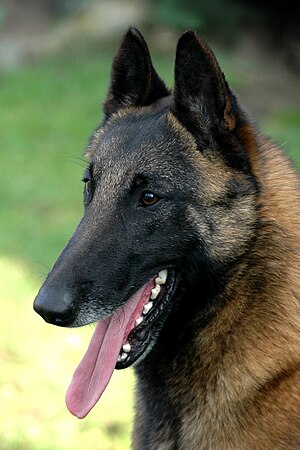
- Image via Wikipedia
French study says dogs can detect prostate cancer
There is new research that suggests dogs can sniff out signs of prostate cancer in human urine.
The lead author of this latest study said the findings are promising and could lead to better cancer-sensing technology.
“The dogs are certainly recognizing the odor of a molecule that is produced by cancer cells,” said French researcher Jean-Nicolas Cornu, who works at Hospital Tenon in Paris.
The problem, he said, is that “we do not know what this molecule is, and the dog cannot tell us.”
Still, the report could represent a significant development since cancer often goes undetected until it is too late to treat.
The detection of prostate cancer has been particularly controversial. Some researchers think many patients are treated unnecessarily because existing tests of prostate-specific antigen (PSA) aren’t accurate enough and fail to distinguish between dangerous and harmless cancers.
Urine tests can turn up signs of prostate cancer, Cornu said, but miss some cases. Some types of molecules give a distinct odor to urine, “but today there is no means to screen odors from urine and separate them,” he said, and no way to link them to cancer.
Enter the dog, whose powers of smell are far greater than those of humans.
For this study, two researchers spent a year training a Belgian Malinois shepherd, a breed already used to detect drugs and bombs.
The dog was trained to differentiate between urine samples from men with prostate cancer and men without. Ultimately, researchers placed groups of five urine samples in front of the dog to see if it could identify the sole sample from a man with prostate cancer.
The dog correctly classified 63 out of 66 specimens.
If the findings hold up in other studies, they’ll be “pretty impressive,” said urologist Dr. Anthony Y. Smith, who was to moderate a discussion on the findings Tuesday at the American Urological Association annual meeting in San Francisco.
Skeptical researchers are concerned about factors that could throw off the results, said Smith, chief of urology at the University of New Mexico. Among other things, scientists wonder if the animals used in such studies pick up on subconscious signals from researchers.
Still, in this study, it’s hard to imagine anything “other than the dogs somehow being able to smell something that we don’t smell,” Smith said.
If these findings are valid, they could lead to the development of more accurate tests that don’t require unnecessary biopsies, Smith said.
The next steps are to determine precisely what the dogs are sniffing and to develop an “electronic nose” to detect it, Cornu said. Other dogs are already being trained, he said.
Could doctors and hospitals employ dogs and researchers to detect prostate cancer? Cornu said that’s possible, but it could cost as much as hiring two full-time scientists.
This is a story from HealthDay, a service of ScoutNews, LLC.
Related articles by Zemanta
- Dog Sniffs out Prostate Cancer in Small Study (nlm.nih.gov)
